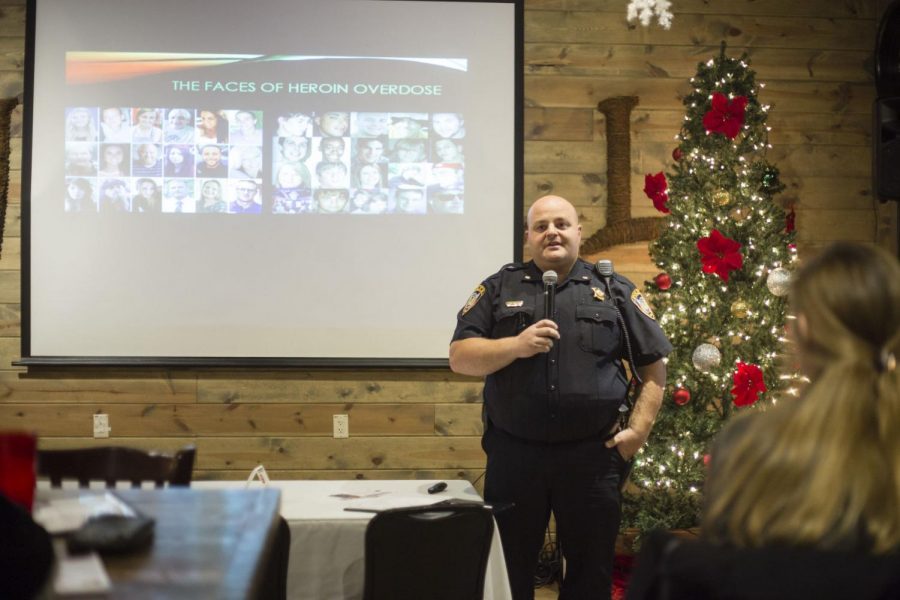DeKalb PD brings hope to opioid epidemic
Steve Lekkas, DeKalb Police Department Patrol Division commander speaks at a December forum on the opioid epidemic in DeKalb.
April 5, 2018
DeKALB — DeKalb Police Department and other community groups are developing Project HOPE: Heroin Outreach, Prevention, and Education to address the opioid epidemic.
Project HOPE is an amnesty program that receives government funding and is staffed with health care providers, said Steve Lekkas, DeKalb Police Department Patrol Division commander. The program allows an individual who has decided to seek help with their opioid addiction a resource to reach recovery.
Lekkas has voluntarily started a network of partnerships with rehab and counseling services throughout northern and central Illinois and advises those who are seeking help with their addiction to go to the DeKalb Police Department.
Lekkas said the program’s goal is to help people immediately by providing easier access to rehab facilities instead of dealing with a waiting list or a lack of insurance, which could result in them walking away.
“Unfortunately, not many can get the help they need, and then they relapse because it is hard to do and they give up.” Lekkas said. “We try to take advantage of the window of opportunity and get them into a rehab center.”
The program was initiated about three years ago and has started to become a reality in the past few months, Lekkas said. The logistical problems of finding efficient transportation have to be solved, but after approval from DeKalb Police Department supervisors the program will be properly advertised Lekkas said.
After Project HOPE is fully operational, Lekkaa said DeKalb Police Department officials would like to hold a press conference for voluntary partners throughout Illinois.
The expectations of contributing resources the DeKalb Police Department can provide is to avert people off of drugs and try to become productive members of society again, Lekkas said.
Project HOPE is part of the DeKalb Police Departments’ 20/20 Vision for the Future plan which focuses on improving the community by making it safer for residents, according March 20 City of DeKalb documents.
Lekkas said after a brief evaluation the police department will determine which rehab facility is the best fit and find patients a way to get to the center.
Currently, six rehab facilities and one counseling center have volunteered to be a part of the program and offer their services, Lekkas said. The partnership accommodates patients who are without insurance.
Northwestern Medicine Ben Gordon Center, 12 Health Services Drive, and Braden Counseling Center Counseling, 2600 Dekalb Ave Suite J, are the two local outpatient facilities offering services for the Project: HOPE initiative.
Mallory Ludwig, certified alcohol and drug counselor for Braden Counseling Center, said the number of opioid users has increased based on people using the addictive drug recreationally or getting it through prescribed medication.
“I think that is one of the biggest issues,” Ludwig said. “People are not educated enough about opioids, and they eventually become physically dependent to it. The only way people know how to stop the withdrawal symptoms is to keep using.”
Ludwig said the goal of their facility is to educate people and identify what leads an individual to use drugs to cope with life disturbances.
Ludwig said inpatient facilities have the patients living at the rehab or counselling center which try to set a strict schedule to give the patient’s life structure.
The schedule would consist of meals, group or individual therapy sessions and daily activities set at specific times, Ludwig said.
Outpatients facilities are divided into a regular or intensive program and the patients are place depending on their needs Ludwig said.
Intensive outpatient facilities are not as extreme as the inpatient centers but give more order to the patient’s overall life than the regular facilities, Ludwig said.
Intensive services require the patient to participate at least nine hours per week of individual or group treatment sessions but allows them go home at night Ludwig said. A regular outpatient facility, like Braden Counseling Center, requires three to seven hours per week of treatment sessions.
“We want to take advantage to what we have locally because they are going to be beneficial to the outpatient services if people choose to come back to this community,” Lekkas said.














